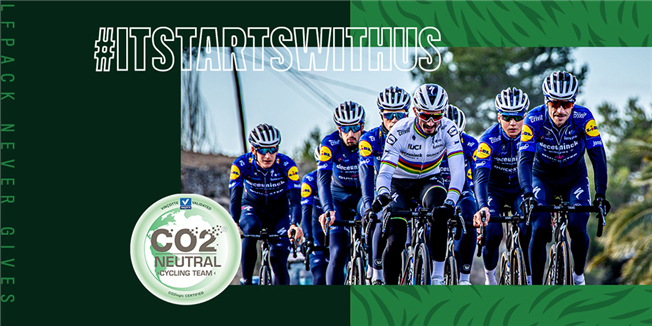Twelve months on from launching #ItStartsWithUS, our team has successfully offset all carbon emissions for 2020
24-Feb-2021: Ever aware of the impact that travelling the globe to compete in the world’s biggest bike races has on our environment, the team partnered with the leading experts CO2Logic and calculated their carbon footprint to be 1288 tons of CO2, which is the equivalent of driving a car 179 times around the world, or 539 return flights between Brussels and New York. The amount of forestation required to capture this amount of CO2 is the equivalent of around 3099 football pitches.
To help offset this, Deceuninck – Quick-Step chose to support two international based projects: one helping to supply safe drinking water in Uganda and one to help with the reforestation of the area around Mont Ventoux. The Uganda project has supplied over 1.9 million litres of clean water to 823 people. Over 45% of Uganda’s population has no access to safe water, meaning people are forced to boil water in order to make it safe to drink, which not only releases greenhouse gases but requires the cutting down of trees to provide firewood. This project alone has preserved over 815 hectares of trees and offsets nearly 1300 tones of CO2.
The Mont Ventoux project has seen several areas of forest designated for sustainable forestry management and conservation. Supporting this project not only halts the cutting down of trees but helps to managing the woodland area, to help it grow healthier and stronger. As well as being close to the iconic climb of Mont Ventoux, the project sits close to Deceuninck – Quick-Step’s hearts, as the woodland area is a better habitat for the wild wolves, the animal who the Wolfpack share so much with in name and spirit alike.
As well as look to offset its CO2 emissions, the team set out a manifesto of pledges to help reduce its overall environmental impact, including reducing the reliance on plastics and promoting a culture of recycling, reducing energy consumption, and promoting the bicycle as a viable mode of transport. The campaign has been warmly supported by our sponsors and partners, who have joined wholeheartedly in our attempt to build a more sustainable future.
Speaking of the first year of #ItStartsWithUs, Deceuninck – Quick-Step CEO Patrick Lefevere said: “We are delighted with the findings from the first year of or campaign. At the start of 2020 we made a commitment to not only offset our CO2 emissions but also to change the behaviours of our team, our staff and our supporters. We don’t need to remind anyone of how difficult 2020 proved to be and we know we could have achieved so much more, but despite this, we are very proud of what we have achieved. Cycling is a beautiful sport that has drawn us all together, but we need to look at how we can compete in races held all over the planet while still protecting the fragile environment around us. Since we launched the project, we have noticed a changing of the tide within cycling, with the UCI very recently announcing changes to the rules on dealing with waste during a race. This is just the start of what we hope can be a big movement within the sport and we will be look to push event further in 2021.”
“2020 was a difficult year for everyone but we have observed a growing solidarity and willingness to tackle the climate emergency together. It is the same with Deceuninck – Quick-Step, they will again take their climate responsibility by offsetting their remaining climate impact. Meanwhile we are working together to further reduce their CO2 emissions”, said Antoine Geerinckx, founder of CO2logic.
CO2logic is an independent social enterprise specialized in calculating, reducing, and offsetting CO2 emissions. CO2logic also supports and develops climate projects in developing countries (Burkina Faso, Benin, Uganda, DRC, Rwanda, Zambia, Guatemala, Chili, etc.) in partnership with local NGOs in order to offset the incompressible carbon footprint of climate responsible CO2 Neutral organisations. The CO2 Neutral label (validated by Vinçotte) ensures that organizations also take responsibility for their remaining emissions and climate impact.





